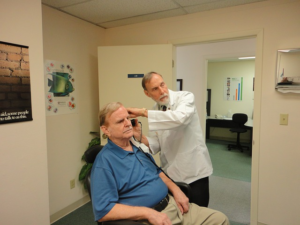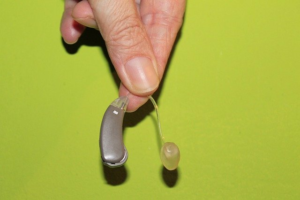Hearing aid coverage could be ‘transformational’ | Hub – The Hub at Johns Hopkins
By
Marlene Cimons
/
Published
Nov 15, 2021
About half of all Americans older than 60 and two-thirds older than 70 have some degree of hearing loss, according to Johns Hopkins University researchers. Many older people cannot afford the prohibitive price of hearing aids, which can cost thousa…….

By
Published
Nov 15, 2021
About half of all Americans older than 60 and two-thirds older than 70 have some degree of hearing loss, according to Johns Hopkins University researchers. Many older people cannot afford the prohibitive price of hearing aids, which can cost thousands of dollars, or are reluctant even to admit they have a hearing problem.
Image caption: Nicholas Reed
Medicare has never covered the cost of hearing aids—an omission that has long presented a barrier to older people who would gain from access to these life-altering devices. But that could soon change. The $1.75 trillion social spending bill currently under consideration by Congress provides a Medicare hearing benefit for the first time in the history of the 56-year-old health insurance program for those 65 and older. This proposed expansion follows the Food and Drug Administration’s recent release of new regulations allowing the sale of over-the-counter hearing aids. Together, these two major policy changes would be the biggest advances to hearing care in decades.
To understand the implications for older Americans with hearing loss, the Hub spoke with Nicholas Reed, a clinical audiologist and assistant professor in the department of epidemiology and core faculty at the Cochlear Center for Hearing and Public Health at the Johns Hopkins Bloomberg School of Public Health.
How significant a change is this? When it comes to hearing, has traditional Medicare covered anything?
Nothing on the hearing aid side has been covered since the inception of Medicare in 1965. In fact, anything related to hearing aids is a statutory exclusion under current Medicare. Hearing wasn’t really considered part of health care—it was an afterthought. Also, at the time it made sense not to include hearing aids because the technology was nascent, and not terribly advanced. The older technology wasn’t really suited for all types of hearing loss. Today, however, modern hearing technology can address a wide range of hearing losses in individuals. Traditional Medicare covers a hearing test if it’s ordered by a physician as part of a medical evaluation, but it does not cover hearing aids. If this legislation passes, Medicare will finally catch up to the technology and the thinking about the health impacts of hearing loss, both on the individual and from a public health perspective. It is very much a big deal. Age-related hearing loss is a major issue for millions of Americans, and Medicare access to hearing aids and hearing care services would make a tremendous difference for them.
What has been the impetus for making this change?
I think including hearing loss in these public health policies represents …….
Source: https://hub.jhu.edu/2021/11/15/medicare-hearing-aid-coverage-nicholas-reed/







